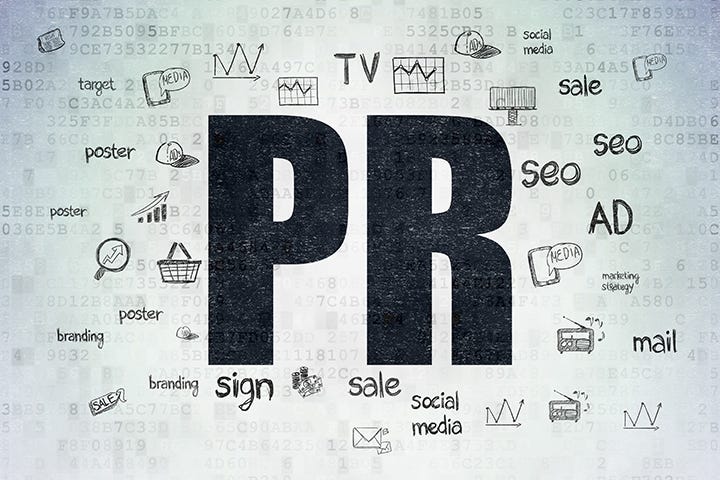
The current business landscape is intensely competitive. Today, more than ever, it is increasingly difficult to distinguish oneself in the market. Companies must continuously explore innovative methods to gain a competitive advantage and stimulate growth. Surprisingly, public relations can serve as one of the essential yet often underestimated tools. PR can become a subtle but potent weapon, as many businesses have yet to realize its immense power and potential.
By recognizing the strategic importance of PR in business and integrating it into the overall business strategy, companies have the opportunity to take control of their brand. By enhancing your media communication, you can boost your company’s positive brand perception, strengthen your brand reputation and image, and ultimately drive business growth.
In this article, we explore the world of public relations to emphasize why incorporating PR strategies into daily business operations is crucial for businesses aspiring to thrive in today’s fast-paced business environment.
Understanding Public Relations
What is public relations PR? Public relations, commonly referred to as PR, plays a vital role in the strategic communication process for organizations across various sizes and industries. Essentially, PR is about managing and sharing information on behalf of businesses or individuals to build strong relationships and positively shape public perception. To reach these goals, PR professionals use different media channels to deliver well-crafted messages, often working closely with marketing, communications, and advertising teams.

PR is a powerful tool that can help companies achieve many objectives, such as boosting brand awareness, handling crises, smoothly introducing products, organizing events, and supporting overall communication strategies. PR firms often collaborate with specialists in PPC management and social media marketing to enhance their clients’ reputations within their industries by using tactics like timely press releases or strategic social media posts. This teamwork is essential for keeping a positive public image and fostering good relationships between companies and their target audiences.
The Importance of Public Relations in Business
Public relations in business is often underestimated, misunderstood, and overlooked by many business professionals. However, those who take the time to grasp its principles and integrate them into their companies might discover its potential as a true game-changer for their digital marketing strategies. While both PR and advertising fall under the marketing umbrella, they differ significantly in their approach and underlying principles. PR is not always the first choice for company promotion, but for those who fully embrace its core concept, it can wield transformative power without sidelining advertising as a marketing tool.
At its core, the importance of PR in business lies in its role as the behind-the-scenes architect of a narrative designed to shape the desired perception of a company. By combining various tactics with the unique skills and talents of PR professionals, public relations generates publicity through orchestrated actions that captivate audiences and build strong brands. The importance of PR in business also includes creating emotional connections between brands and their clients that go beyond mere transactions. In this space, brands evolve from being pushy sellers to storytellers, crafting narratives that inspire, empower, and resonate deeply with their target audiences.

Moreover, innovation in PR extends beyond storytelling. It harnesses the power of collaboration, establishing mutually beneficial relationships with journalists and publishers that drive business growth and open up new opportunities. Brands that actively implement PR strategies in conjunction with search engine optimization (SEO) and other digital marketing trends have the chance to emerge as thought leaders and, eventually, iconic brands in their industries. These brands don’t just have customers—they have devoted followers who are willing to purchase anything without questioning its price.
PR builds and manages reputation
Reputation is crucial in business, and many believe it’s a company’s most valuable asset. Building a reputation is a formidable task, yet losing it can happen swiftly and easily. It’s essential for companies to actively foster their reputation daily. Notably, a solid reputation isn’t achieved through increased advertising spending. Instead, earned publicity, which results from a well-executed public relations strategy and follow-up tactics, often proves much more effective than paid publicity. PR serves as a subtle yet powerful tool to enhance a company’s reputation, employing non-invasive and strategic methods that are not only more effective but also cost-efficient compared to traditional advertising.
Comment
byu/kj199239 from discussion
inPublicRelations
PR enhances brand visibility and awareness
In today’s competitive market, the importance of PR in business becomes apparent as it directs attention to brands at critical moments. PR specialists are adept at building relationships with journalists and influencers, crafting the desired public narrative. Utilizing various PR tactics like media relations, content creation, and event management, they significantly boost a brand’s visibility. This enhanced visibility helps a brand stand out, increasing recognition and retention among consumers, which is crucial for business growth.
PR establishes credibility and trust
Credibility and trust form the foundation of successful brands. Public Relations is key in moulding these elements by shaping how stakeholders perceive a brand. Through strategic storytelling and transparent communication, PR secures a brand’s reputation as trustworthy and credible.

Long-term media relationships further establish a brand’s authority, reinforcing stakeholder confidence. The importance of PR in business in fostering trust and credibility is paramount, as these qualities attract and retain customers, partners, and investors.
PR generates thought leadership
Beyond media relations, the importance of PR in business extends to cultivating thought leadership. PR professionals elevate key figures within a company to the status of industry experts through strategic engagements and insights. This not only bolsters a brand’s credibility but also aligns it with innovation and expertise, crucial traits for gaining stakeholder trust and establishing a strong market presence. Integrating PR into a digital marketing strategy for the global market can significantly enhance a brand’s influence and authority on an international scale.
PR contains crisis
The unpredictable nature of business means crises can strike unexpectedly, potentially damaging reputations. Here, the importance of PR in business is critical as it plays a key role in managing such crises. PR professionals excel in rapid response, ensuring that accurate information prevails and mitigating misinformation. Their expertise in handling crises reassures stakeholders and prevents long-term reputational damage, illustrating the indispensability of PR in maintaining brand integrity.
PR builds media relationships
The mutual benefits of relationships between PR professionals and journalists highlight the importance of PR in business. Effective PR strategies involve personalized pitches that cater to journalists’ interests, fostering long-term collaborations.

These relationships are vital for securing positive media coverage, thereby enhancing brand visibility and credibility—essential components for business growth.
PR generates positive media coverage
Positive media coverage is integral to a company’s success, highlighting the importance of PR in business. It not only boosts a company’s visibility and credibility but also enhances consumer trust and attracts investors. PR professionals play a crucial role in generating media coverage that differentiates a brand from its competitors, establishing it as a leader in its field. Conducting a digital marketing audit for global markets can further refine these efforts, ensuring that the brand’s media presence resonates well across different cultural and regional landscapes.
PR influences public opinion
PR has a significant impact on public opinion, shaping perceptions of a brand’s products or services in a favourable light. The strategic communications and relationships fostered by PR professionals help cultivate a positive brand reputation. Their expertly crafted narratives play a crucial role in how the public perceives a brand, underscoring the importance of PR in business for maintaining a favourable public image.
PR facilitates industry partnerships
Strategic partnerships are pivotal for business growth, and the importance of PR in business is evident in facilitating these collaborations. PR professionals leverage their skills and connections to identify and engage potential partners that align with business goals. These partnerships, often boosted by PR efforts, enhance brand visibility, credibility, and market reach, demonstrating the significant role of PR in achieving business success and profitability.
Conclusion
With digital media’s rapid growth and the increasing influence of public perception, the importance of PR in business has become more evident. PR not only enhances brand visibility and manages reputations but also acts as a catalyst for business expansion. It transcends traditional marketing by establishing credibility, trust, and effective crisis management.
Furthermore, PR is crucial for nurturing investor relations and promoting thought leadership, positioning companies as industry leaders. By fostering strategic partnerships and collaborations, PR supports business growth and market expansion. A well-executed public relations strategy can elevate a brand to visionary status, transforming it into an iconic industry leader.






